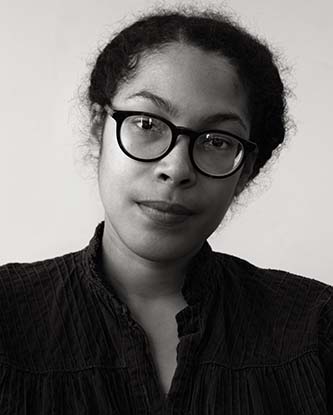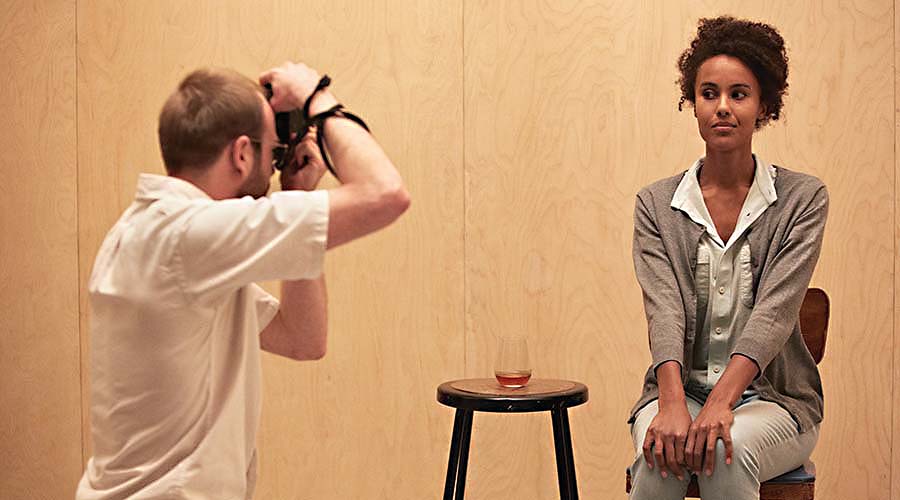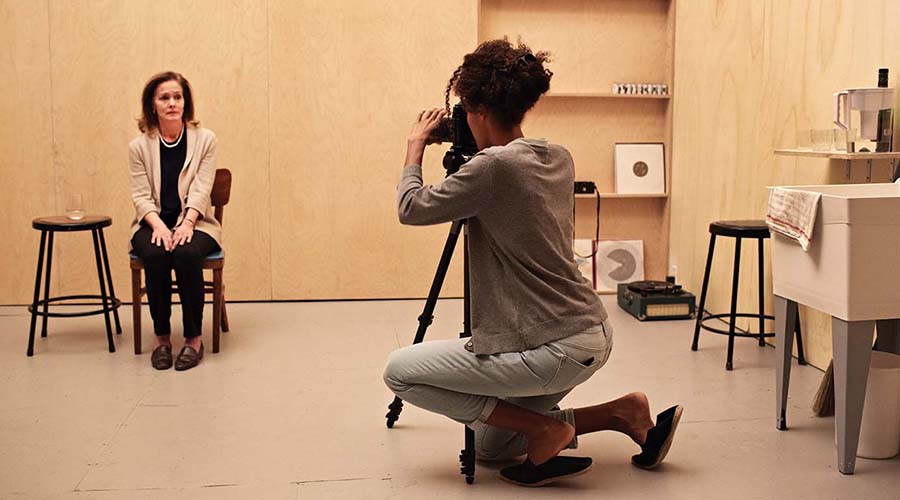Jackie Sibblies Drury and writer/director Richard Maxwell met though Drury’s agent, and when Maxwell told Drury he might want to stage her play Really, she says she “freaked out a little bit.” In March the pair collaborated on the play’s premiere with the company where Maxwell serves as artistic director, New York City Players, at Abrons Arts Center. Here, they discuss their work together.
The full playscript of Really can be found in the September 2016 issue of American Theatre.

Richard Maxwell: So, some people I spoke with after they saw the show, who knew me and not you, were like, “Was the playwright okay with what you did?”
Jackie Sibblies Drury: I got that too! And I was like, “I mean, I was in the room for all of the rehearsals, so I was pretty much aware.” It’s like they thought I wrote a sitcom and I gave it to you, and then you turned it into experimental downtown theatre. But it didn’t feel like you “Richard Maxwell-ed” the play, whatever that means.
Almost from the get-go we’d been talking about staging the play inside a camera obscura. I wasn’t sold on the idea because it seemed too literal.
Yeah, and I was like, “I love literal.”
Michael Schmelling (set and lighting designer) and Dirk Stevens (carpenter) were working out the box, and I remember feeling like it was such a victory when we learned that we could get not 30 people in there but 40! I’m wondering what you felt about the limitations in terms of audience.
I get excited about having theatre feel like an intimate experience where as an audience member you’re both physically close to people performing and also aware of yourself as being in public. I got excited by our production because people felt like they needed to be quiet. And when someone had a reaction—even just a throat clearing—it felt so alive in that space.
Will you put it into the play?
I felt like it was proprietary, and so in the version that I sent to American Theatre I didn’t say, “This play should happen inside a camera obscura,” because that was particular to our production. I’d imagine it probably won’t happen that way in the next productions of it.
Do you feel like something was lost?
It’s funny…both completely and not at all. There was so much of the play that was trying to explain itself—sort of superfluous writing—so getting to the point where the script felt really clean was exciting. And I think that I haven’t been able to do that in a rehearsal process to that extent before, like allowing the characters to exist in their emotional states without having to describe their emotional states to the audience. I feel like the only things that were lost were opportunities that the set provided that I just didn’t know about because we didn’t know if the camera obscura would work.
I have a hunch that actors generally really like what you write. I think this is where a lot of writers get lost: making a distinction between what’s written at home and what gets spoken in the rehearsal, or ultimately performance. Is it something that you’re deliberately cultivating?
I like actors, which feels like a weird statement to make, but there are playwrights who don’t. I like to try to make lines that feel good to say. Or where the words aren’t indicating so much as existing in the text. Where the play’s not creating things that actors have to do, but creating opportunities that performers can do things with. I also just—it’s totally compulsive—want to have the way that the words fit together to be able to come out of someone’s mouth in a way that seems not naturalistic, or realistic, but true…in some way.
One of the first questions I asked you was, “What does it mean to be a black woman playwright?” I wonder if, based on your answer, we steered clear of this facet of the play.
It felt like if race was the only thing we dealt with in rehearsal, it would be sort of minimizing that character and minimizing the ways that the audience could deal with her. It was nice that they were forced to deal with her as an artist, as a woman, a woman of color, a woman in a relationship, as a multifaceted human; I think that doesn’t happen a lot.
I wonder if you could talk a little bit about what it is for you—that we have this double standard with regard to the term “genius” for a woman or for a black person.
Well, it seems as though it’s a lot easier for people to think that a white man is a genius than a black woman, and that the work that a white man is doing can be important to the field rather than important to diversity. But I also feel like the character of Girlfriend isn’t there to exist onstage being a race. If she is black, she doesn’t have to be it to the exclusion of other things. But I do think that because there are two white people and one brown person onstage, that makes it a piece about race, so her race or their race didn’t have to be constantly talked about. When I talked to some black people who saw the show—and also some other people—there was this dark laughter of recognition of the dynamic between those two female characters.
Who’s laughing?
The black people are laughing. [Laughs] But they’re like laughing with recognition at seeing a situation where there’s a very tolerant older white person who is being so gracious to you, to condescendingly allow you to do what it is that you have been doing for your whole life.

I feel like in my mild trafficking through the art world, it’s clear how few black people there are, but it also feels kind of disingenuous any time a white person says, “Hey, where are the black people?” I remember this Whitney [Museum] event and there was a question-and-answer period with like an outreach group. One of the questions from the audience was, “Why are there so few black artists in this biennial?” The answer kind of surprised me. It was like, “Well, we feel like we looked at the art that was out there, and we didn’t want to be condescending and include black people for the sake of including them.”
Yikes.
I feel like this is a conversation that really should be happening.
It seems like the conversation about race in theatre happens all the time, in terms of memes mostly. People talk about casting and people talk about Hamilton and how the Tonys were diverse and about all-white-male seasons, and so it feels like it’s comfortable to talk about race in terms of things you can post on social media, but we can’t necessarily have a conversation about race outside of a sort of “I’m a liberal embracing difference” kind of thing. In some ways it surprises me when people include any aspect of race in their work that isn’t under the guise of trying to demonstrate that they’re a good person, or to allow a white audience to feel like they’ve done something good by seeing someone who is black or Asian or Latino.
Is that a kind of defense of what this person representing the Whitney Museum said?
[Jokingly] Yeah, I think that it’s true, there just aren’t any good black artists. No, but it does seem like we don’t think about the standard by which we’re evaluating work, like what has gone into formulating our judgment of what we think is good—that the standard is based on the canon. You’ve dealt with race in your work before, but I don’t know if that’s something that people expect of your work, necessarily.
No, for what it’s worth, I like to introduce race to provoke a liberal audience. I feel like we have to see what’s past that condescension. We have an idea of what the demographic looks like when you imagine an audience for a play of yours or a play of mine. And we wanted black people to watch this play. We were thinking about how to promote this in the right way. But other than to hire black people or to have black artistic directors, I don’t know how you really get beyond this rather monolithic demographic.
Yeah, and in terms of black people who came to see the play, a lot of them, like me, were not African-American; there were a lot of people who were born in Africa or whose parents were born in Africa or people from the Caribbean. I’m pretty invested in blackness not as this monolithic thing, but as a community in and of itself, with a lot of diversity in terms of culture and in terms of self-presentation.
I came across an interview with Sam Shepard, and the interviewer asks, “What’s it like to be a playwright?” He basically says, “I think it’s a dubious pursuit to want to have a career as a playwright.”
That sounds fair. I feel really uncomfortable even using the word “career” around the word “playwright.” I like making theatre. It’s hard to think about it as a career. I feel like my career right now is teaching. I don’t feel like a professional playwright. I don’t know if I believe that anyone should be a professional playwright right now, with everything that’s going on in the world. Because it seems like you have to write plays about something, and it can’t always be about theatre, so you should, like, do something else. If only to have something to write about.
A version of this story appears in the September 2016 issue of American Theatre.


